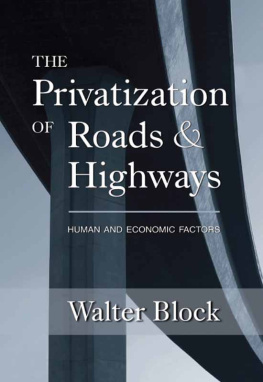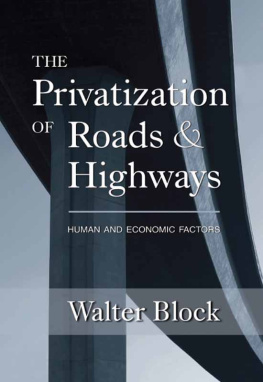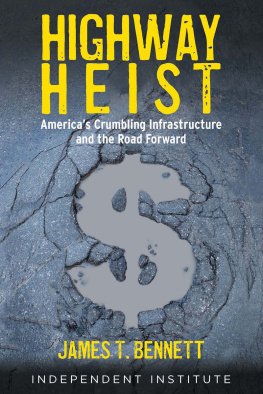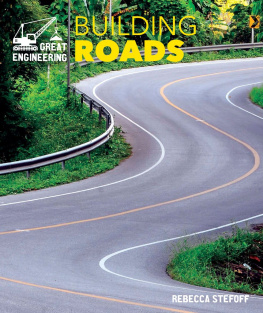Walter Block - The Privatization of Roads and Highways: Human and Economic Factors
Here you can read online Walter Block - The Privatization of Roads and Highways: Human and Economic Factors full text of the book (entire story) in english for free. Download pdf and epub, get meaning, cover and reviews about this ebook. year: 2009, publisher: Ludwig von Mises Institute, genre: Politics. Description of the work, (preface) as well as reviews are available. Best literature library LitArk.com created for fans of good reading and offers a wide selection of genres:
Romance novel
Science fiction
Adventure
Detective
Science
History
Home and family
Prose
Art
Politics
Computer
Non-fiction
Religion
Business
Children
Humor
Choose a favorite category and find really read worthwhile books. Enjoy immersion in the world of imagination, feel the emotions of the characters or learn something new for yourself, make an fascinating discovery.
- Book:The Privatization of Roads and Highways: Human and Economic Factors
- Author:
- Publisher:Ludwig von Mises Institute
- Genre:
- Year:2009
- Rating:5 / 5
- Favourites:Add to favourites
- Your mark:
The Privatization of Roads and Highways: Human and Economic Factors: summary, description and annotation
We offer to read an annotation, description, summary or preface (depends on what the author of the book "The Privatization of Roads and Highways: Human and Economic Factors" wrote himself). If you haven't found the necessary information about the book — write in the comments, we will try to find it.
The Mises Institute is pleased to introduce Walter Blocks remarkable new treatise on private roads, a 494-page book that will cause you to rethink the whole of the way modern transportation networks operate. It is bold, innovative, radical, compelling, and shows how free-market economic theory is the clarifying lens through which to see the failures of the state and see the alternative that is consistent with human liberty.
He shows that even the worst, off-the-cuff scenario of life under private ownership of roads would be fantastic by comparison to the existing reality of government-ownership of roads, which is awful in ways we dont entirely realize until Block fully explains it (think: highway deaths).
But that is only the beginning of what Professor Block has done. He has made a lengthy, detailed, and positive case that the privatization of roads would be socially optimal in every way. It would save lives, curtail pollution, save us (as individuals!) money, save us massive time, introduce accountability, and make transportation a pleasure instead of a huge pain in the neck.
Because this is the first-ever complete book on this topic, the length and detail are absolutely necessary. He shows that this is not some libertarian pipe dream but the most practical application of free-market logic. Block is dealing with something that confronts us every day. And in so doing, he illustrates the power of economic theory to take an existing set of facts and help see them in a completely different way.
Whats also nice is that the prose has great passion about it, despite its scholarly detail. Block loves answering the objections (Arent roads public goods? Arent roads too expensive to build privately?) and making the case, fully aware that he has to overcome a deep and persistent bias in favor of public ownership. The writer burns with a moral passion on the subjects of highway deaths and pollution issues. His Open Letter to Mothers Against Drunk Driving is a thrill to read!
People have known that Block had been working on this book for many years, and some chapters have been seen in journals here and there. But there is something thrilling about seeing it all put together in one place. It comes together as a battle plan against government roads and a complete road-map for a future of private transportation.
Walter Block: author's other books
Who wrote The Privatization of Roads and Highways: Human and Economic Factors? Find out the surname, the name of the author of the book and a list of all author's works by series.













